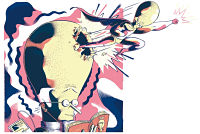Self-confidence school: Can you really fake it to make it? (2015)

How vulnerable are we to our hormones – and are there physical tricks to producing more of the confidence-enhancing hormone that boosts motivation and risk-taking – or less of the cortisol that inhibits those behaviours?
William Lee Adams,
New Scientist 18 June 2015
Image: Renaud Vigourt
“Confidence … can have an inverse relationship with performance: the Ancient Greeks invented the word hubris for a reason, and studies have shown, for example, that incompetent individuals are much more likely to overestimate their skills than competent ones. … (But) In many important situations …. confidence can affect performance no matter how skilled the person is to begin with.
“Confidence is something we tend to regard as coming from within, but (there are many social scientists) researching how subtle influences – from music to how we walk – can affect it.
“It’s an idea that has grabbed the public imagination: a lecture by Amy Cuddy of the Harvard Business School, entitled “Your body language shapes who you are”, is the second most watched TED talk ever, with over 32 million views and counting. Cuddy recommends striking superhero-style “power poses” to buoy self-assurance in advance of high-stakes situations: her research suggests that doing this can improve performance significantly.”
“Another researcher found that “people who adopt more confident poses produce more testosterone, which boosts motivation and risk-taking, whereas those that take up insecure poses produce more of the stress hormone cortisol.”
Access the article here: Self-confidence school






Leave a comment
Back to the top